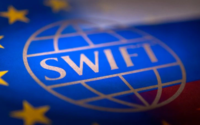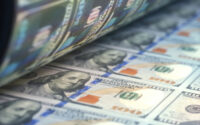Global Bond Rally Stalls as BOJ Hike Bets Meets US Jobs Caution
(Bloomberg) — The sizzling global bond rally stalled on Thursday ahead of a key US jobs report, with a slump in Japanese debt adding to the nerves of Treasury traders already fretting that yields had dropped too far.
Most Read from Bloomberg
The yield on 10-year US notes jumped as much as eight basis points to 4.18%, paring declines this week to two basis points. Similar-dated Japanese yields soared by the most this year, after a weak auction of long-term debt and comments from central bank Governor Kazuo Ueda on more challenging policy ahead. European bonds also fell.
The correction comes after a strong run for global bonds fueled by ramped up bets on interest-rate cuts by major central banks. Investors are now turning their attention to Friday’s US payrolls to fine tune bets ahead of next week’s Federal Reserve, European Central Bank and Bank of England meetings. The Bank of Japan meets the following week.
“The rally in the global bond market has gone very fast and far in November, so it is reasonable to pause,” said Janet Mui, head of market analysis at RBC Brewin Dolphin.
Bond investors came into the week facing key tests from US data on the labor market. The first couple of reports favored bets on a Fed pivot toward rate cuts, but Friday’s jobs data may easily overwrite that impression.
Economists estimate US unemployment was steady at 3.9% last month, with the economy adding 185,000 jobs, up from October’s 150,000 reading that was the weakest growth since June.
TD Securities recommended selling 10-year Treasuries ahead of Friday’s report, which puts yields “at risk of backing up sharply.” JPMorgan Chase & Co. strategists highlighted in a note there’s a risk yields may move higher, and added the Treasuries market is showing signs of the traditional year-end poor liquidity.
“There’s certainly been profit taking after the big rally, particularly ahead of US payrolls, where we are looking for an above-consensus number,” said Pooja Kumra, head of European rates strategist at the Toronto Dominion Bank.
Kumra adds that swirling speculation about a BOJ policy shift and the dismal Japanese bond auction also added pressure on the market. A sale of 30-year JGBs received bids for only 2.62 times the securities on offer, the lowest level since 2015.
Meantime, traders speculated the BOJ’s December policy meeting may be a “live” event after Governor Ueda said handling monetary policy will get tougher from the year-end and through next year. Those remarks built on comments Wednesday from one of his deputies that the central bank is inching closer to putting an end to the world’s last negative interest rate regime.
The 10-year JGB yield rose about 11 basis points following the auction, hitting 0.75%. That was the steepest jump since Dec. 20, 2022, when then-Governor Haruhiko Kuroda stunned the market by widening the trading band for the benchmark note.
“The auction seems to have crystallized some of the risks of an earlier than expected policy-exit by the BOJ,” said Calvin Yeoh, who helps manage the Merlion Fund at Blue Edge Advisors.
For Emmanouil Karimalis, macro strategist at UBS Group AG, changes in the BOJ policy should affect global rates markets, but Ueda’s comments may not be enough to stop the bullish trend just yet. The Fed, ECB and BOE decisions will be more important for now, he added.
Traders are currently betting the ECB will be the first to cut rates next year, with a high chance of a move as soon as March and a total easing of as much as 150 basis points. The Fed would start in May and lower borrowing costs by 125 basis points. For the BOE, expectations are for a first cut in June, with about 84 basis points of reductions next year.
“Japan is positioning to start hiking early next year just as other G-10 central banks are going to ease,” said Maya Bhandari, BNP Paribas Asset Management global head of multi-asset in a Bloomberg TV interview. She turned short on Japanese government bonds on Wednesday. “Japan is in a different place to the rest of the world so it doesn’t change the global narrative.”
Benchmark 10-year Treasury yields reached as low as 4.1% this week, a stunning drop of more than 90 basis points from the multi-decade high of 5.02% touched in late October. Equivalent German rates fell to the lowest since May at 2.2%, about 80 basis points lower than the October peak.
“Both valuation and positioning would argue for exhaustion in the recent bond rally,” said Mohit Kumar, chief European economist at Jefferies International. “Given our view of only a mild recession and inflation still remaining sticky, we would argue that the market has run a bit ahead of itself.”
–With assistance from Alice Atkins, James Hirai and Naomi Tajitsu.
(Updates with European bond moves and comments throughout. An earlier version of this story was corrected to say Thursday in the first paragraph)
Most Read from Bloomberg Businessweek
©2023 Bloomberg L.P.
[ad_2]
Source link


